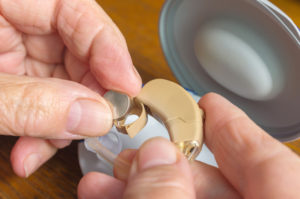 If you’re not experiencing it yourself, you surely know someone that has experienced hearing loss. It’s frustrating regardless of what side you’ve been on.
If you’re not experiencing it yourself, you surely know someone that has experienced hearing loss. It’s frustrating regardless of what side you’ve been on.
Take my dad, for example. It’s easy to carry on a conversation with him. These days, when we’re sitting at least six feet apart, we can go back and forth like we always have. But that doesn’t mean that over the years, my family hasn’t noticed a slip.
Advertisement
Sometimes, for example, it sounds like he’s playing broken telephone with us. Someone will say something, then a moment later he’ll repeat it. The television volume creeps up a little bit, or a comment directed towards him will go unrecognized.
It might seem harmless or like it’s just healthy aging, but it could lead to some health risks down the line. Hearing loss is associated with a higher risk for dementia, as well as mobility problems.
One study from researchers at Johns Hopkins University noticed that hearing might play a pivotal role in dementia risk. After tracking 639 adults for 12 years, scientists found that even mild hearing loss doubled dementia risk.
Moderate hearing loss tripled the risk.
Severe hearing loss boosted the risk fivefold.
The impact seems multifaceted. Brain scans indicate hearing loss may contribute to a faster rate of brain atrophy. Being unable to hear can also make sufferers feel more isolated, as they avoid social contact for fear of embarrassment.
Mobility issues associated with hearing loss are linked to balance. There are unconscious, subtle cues a person relies on as they move through space. When those sounds can no longer be adequately identified, it becomes more difficult to maneuver safely.
Advertisement
Like other organs in your body, ear health can wear away over time. The way you perceive sound may slightly diminish as you age, but there are things you can do that might help slow the process.
Some experts suggest that certain nutrients can help protect hearing. In addition to antioxidants like vitamins A, C, and E, they include:
- Magnesium
- Omega-3 fatty acids
- Potassium
- Folate/Folic acid
Your hearing might affect your health—or that of a loved one—more than you think. Pay attention to how things are sounding and speak to your doctor about ways to improve your hearing.
